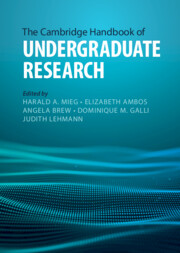Book contents
- The Cambridge Handbook of Undergraduate Research
- The Cambridge Handbook of Undergraduate Research
- Copyright page
- Contents
- Figures
- Tables
- Contributors
- Foreword
- Foreword
- 1 Introduction
- Part I Theory and Research on Undergraduate Research
- Part II Implementation, Approaches, Methods
- Part III Disciplines
- 17 Introduction
- Part III.1 STEM
- 18 Undergraduate Research in Physics
- 19 Undergraduate Research in Chemistry
- 20 Undergraduate Research in Biology
- 21 Undergraduate Research in Mathematics
- 22 Undergraduate Research in Engineering
- 23 Undergraduate Research in Data Science
- Part III.2 Health
- Part III.3 Social Sciences
- Part III.4 Humanities
- Part III.5 Arts & Design
- Part III.6 Disciplines A–Z
- Part IV International Perspective
- Part V Avenues for Developing Undergraduate Research
- Index
- References
23 - Undergraduate Research in Data Science
from Part III.1 - STEM
Published online by Cambridge University Press: 11 August 2022
- The Cambridge Handbook of Undergraduate Research
- The Cambridge Handbook of Undergraduate Research
- Copyright page
- Contents
- Figures
- Tables
- Contributors
- Foreword
- Foreword
- 1 Introduction
- Part I Theory and Research on Undergraduate Research
- Part II Implementation, Approaches, Methods
- Part III Disciplines
- 17 Introduction
- Part III.1 STEM
- 18 Undergraduate Research in Physics
- 19 Undergraduate Research in Chemistry
- 20 Undergraduate Research in Biology
- 21 Undergraduate Research in Mathematics
- 22 Undergraduate Research in Engineering
- 23 Undergraduate Research in Data Science
- Part III.2 Health
- Part III.3 Social Sciences
- Part III.4 Humanities
- Part III.5 Arts & Design
- Part III.6 Disciplines A–Z
- Part IV International Perspective
- Part V Avenues for Developing Undergraduate Research
- Index
- References
Summary
The second decade of the present century has been marked by the growth of data science. The mixture of computing, statistical, and domain knowledge that represents data science has become an essential skill across all sectors of industry, academia, and government. Data science is also inherently multidisciplinary, being able to accommodate a diverse set of backgrounds operating in interdisciplinary teams to have the most impact. Two developments simultaneously took shape around the middle of the decade to catalyze data science research for undergraduates at UC Berkeley. Launched in 2014, the Berkeley Institute for Data Science (BIDS) was designed as a focal point on campus for data science research and software development. In 2015, to meet the growing demand for data science skills among its students, UC Berkeley launched Data 8, an introductory class on the Foundations of Data Science. With these two initiatives, the Data Science Discovery Program was piloted to allow UC Berkeley students coming out of Data 8 and other data science courses to make a real-world impact with partners across academia, industry, and government.
Keywords
- Type
- Chapter
- Information
- The Cambridge Handbook of Undergraduate Research , pp. 230 - 238Publisher: Cambridge University PressPrint publication year: 2022

